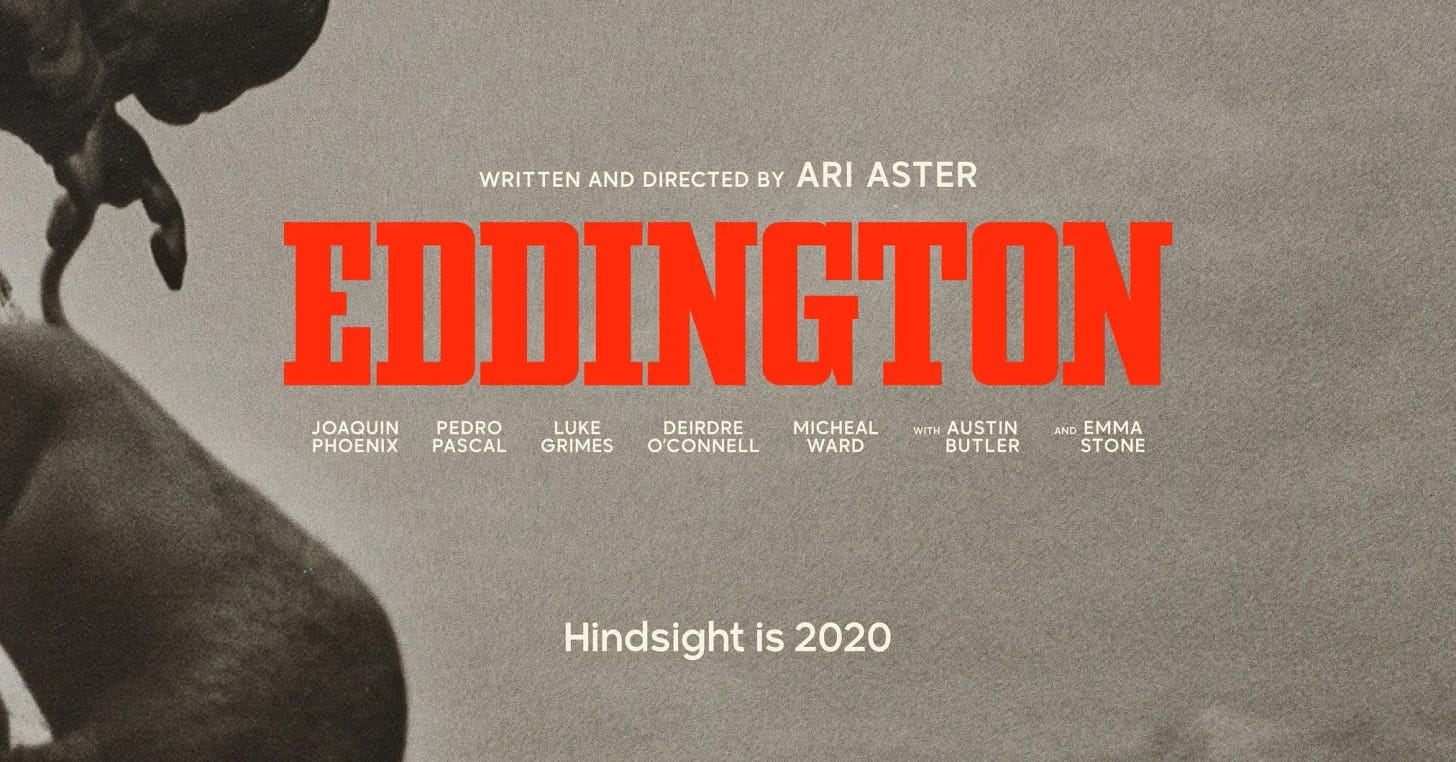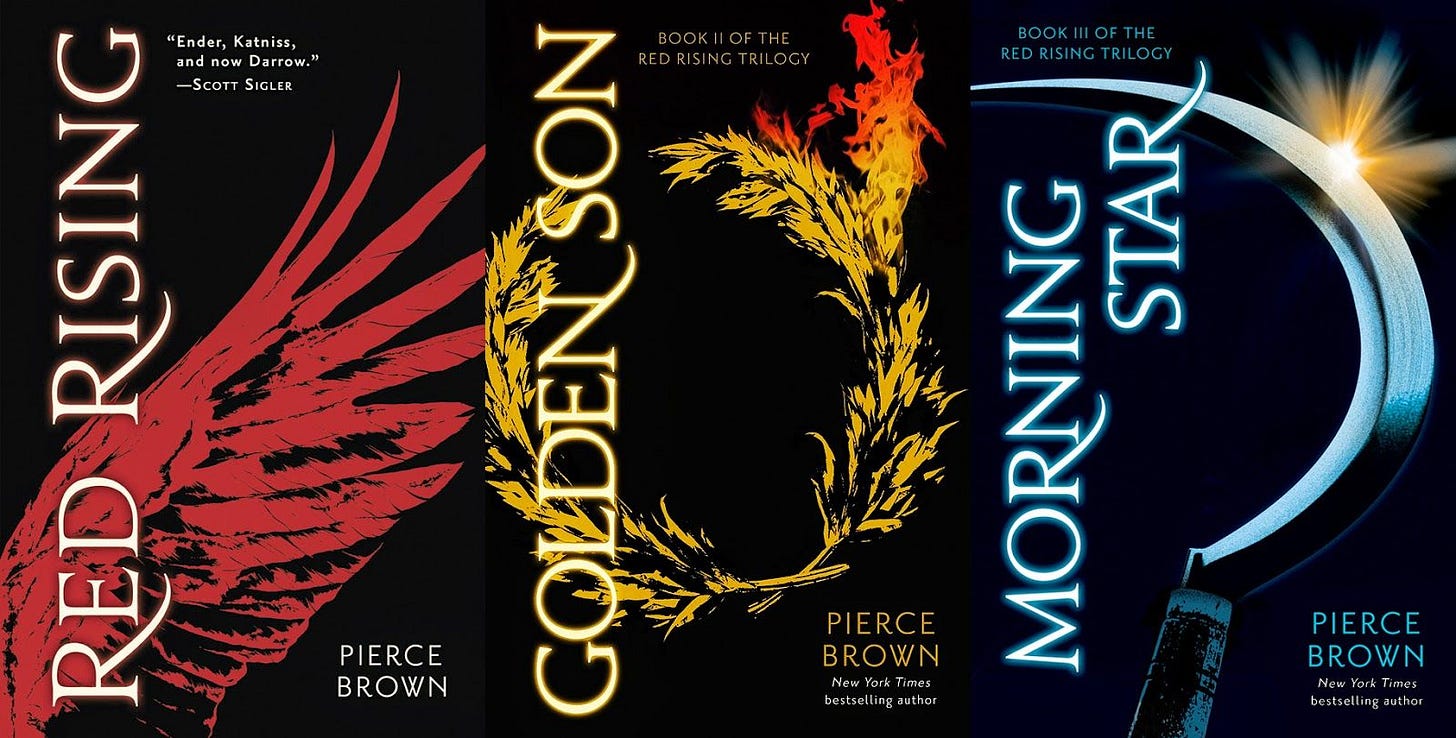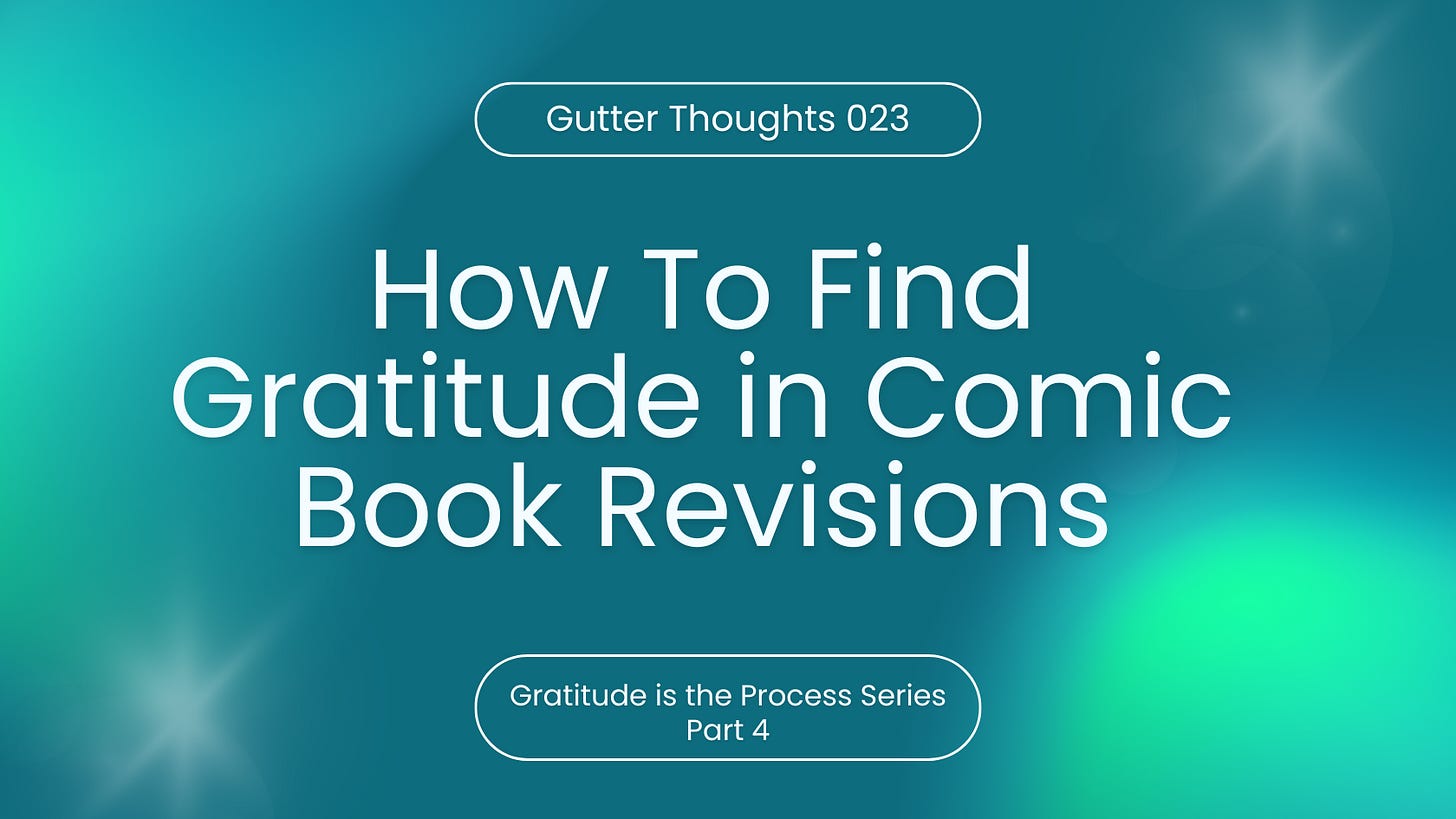Gutter Thoughts 023
Gratitude is the Process: Stoic tools to help comic creators stay focused, consistent, and inspired (Part 4)
This is Part 4 of Gratitude is the Process—a 5-part series on how Stoic gratitude helps comic creators push through rejection, burnout, and creative blocks.
You can start from part 1 right here (it’s the mindset reset I wish I had when I started).
The Stoic Quote of the Week
Every art and every inquiry, and similarly every action and pursuit, is thought to aim at some good; and for this reason, the good has rightly been declared to be that at which all things aim.
— Aristotle, Ethics
I used to hate revisions.
There's something brutal about staring at a page you thought was finished and realizing it's... not. That panel composition that felt so right yesterday now looks awkward. The dialogue that seemed snappy reads clunky. And don't get me started on the feedback—those well-meaning critiques that feel like someone pointing out every flaw in something you poured your heart into.
But here's what I've learned after years of creating comics: the revision phase isn't the cleanup work. It's where the real comic gets born.
"The impediment to action advances action. What stands in the way becomes the way." - Marcus Aurelius.
The Stoics understood something we creators often forget—obstacles aren't roadblocks to our destination. They ARE the destination. Every revision round, every brutal critique, every panel I have to redraw is teaching me something I couldn't learn any other way.
Let me share four practices that transformed how I approach comic revisions. Try these yourself, and watch what used to feel like creative purgatory become the most meaningful part of your process.
Thank Your Critics Before You Read Their Feedback
This sounds ridiculous, I know. But before you open that email or scroll through beta reader comments, pause and say out loud: "Thank you for caring enough about my work to spend time improving it."
Don’t think it. Actually say it.
This small ritual changes everything. The Stoics believed obstacles reveal character, and feedback can be one of our biggest creative obstacles. When someone takes the time to critique your work, even if it's harsh, they're giving you something precious: attention.
The opposite of criticism isn't praise. It's silence. And silence means no one cares enough to engage.
Handle feedback this way:
Read it once and let yourself feel whatever comes up. Defensiveness, frustration, that sting of someone pointing out something you missed—let it all surface.
Then reread it, slower this time. Look for the gold. Even in the harshest critique, find one specific insight that can make your work stronger. Thank the person for that specific thing.
Remember this: the feedback that hurts most often contains the truth you need to hear.
Celebrate Killing Your Darlings as Creative Courage
Every comic creator has that panel. You know the one—beautifully rendered, perfectly composed, BUT completely wrong for the story.
Create a folder on your desktop called "Beautiful Mistakes." Fill it with panels, pages, entire sequences that you love but have to cut. When I started doing this, each deletion used to feel like losing a piece of myself. But Stoicism taught me something powerful: love what serves the greater good, not what serves your ego.
Do what’s best for the story.
When you cut that gorgeous panel that slows down the pacing, you're not losing art. You're gaining story clarity. The willingness to sacrifice good work for great work is what separates the comics people finish from the comics people abandon halfway through.
Make it ceremonial:
Screenshot before you delete anything. Save your killed darlings—sometimes they'll find homes in future projects.
Name each sacrifice: "I'm cutting this because it disrupts the emotional flow." Make the decision feel purposeful, not wasteful.
Count your cuts. Track how many panels, pages, or ideas you remove. Each deletion becomes evidence of your commitment to the story over your attachment to individual pieces.
Remember: the best comic creators aren't the ones who never make mistakes. They're the ones brave enough to fix them.
Transform Technical Work Into Purposeful Practice
Lettering passes. Panel border cleanup. Speech balloon adjustments. This stuff can be a drag and at times feel thankless. But it's where your story becomes readable.
The Stoics found meaning in every task, no matter how small. That tedious lettering session isn't busy work. It's the bridge between your visual ideas and your reader's understanding. Every properly placed word balloon guides their eye exactly where you want it. Every cleaned-up panel edge creates the invisible framework that makes your story flow.
Transform technical work into gratitude practice:
Set tiny intentions for these sessions: "This lettering pass will make the dialogue 10% clearer." Give boring work a clear purpose.
Study how professional comics handle these details. Notice the craft. Appreciation for good technique makes your craft more meaningful.
Ask yourself during every technical pass: "How does this serve my reader?" Every adjustment becomes a small gift to the person who'll eventually read your comic.
Hold onto this truth: the unglamorous work separates comics that get read from comics that get forgotten.
Approach Revision as Discovery, Not Damage Control
Here's the biggest shift: stop seeing revision as fixing what's broken and start seeing it as discovering what's possible.
You didn't get it "wrong" in your first draft. You got it started.
Every revision round reveals possibilities you couldn't see before. That panel that's not working isn't a mistake—it's information about what your story actually needs.
Change your questions. Instead of asking "What's wrong with this panel?" ask "What is this panel trying to accomplish, and how else might I accomplish it?"
Treat revision as your laboratory. It's the safest time to try unconventional solutions because you can always revert to the original approach. So don’t hold back and experiment freely.
Document your process. Keep notes about why you make changes. Future you will thank present you for that creative reasoning (and it makes great social media content, too).
Embrace this truth: every revision teaches you something about storytelling that no tutorial can.
Learn to love this process. I mean really love it, not just tolerate it. Do that and you'll create work that readers actually want devour.
When stressed remember: the mess you encounter in your creative process isn't the problem. It’s the path.
And when you start walking that path with intention, it becomes exactly where you needed to go.
Amor Fati.
If you’ve been enjoying these reflections, take a break and check out something I’ve been pouring my creative energy into. Boom Kid is a raw, heartfelt story about power, identity, and loyalty.
This Week’s Creative Sparks
Here are the shows, books, movies, comics, and more that have sparked my creativity this week:

Movie Spark: Fantastic Four First Steps
I went to see this movie against my will.
Even though I’m a huge fan of the Fantastic Four characters and comics, I wasn’t excited about it—mainly because I’ve been let down before. But my girlfriend really wanted to go, so she took me.
And I’m so glad she did.
I didn’t just like this film—I loved it. Sure, it has its flaws, but overall, it was a solid superhero movie. What I appreciated most was how little it had to do with the rest of the Marvel Cinematic Universe. No multiverse nonsense, no cameos—just a focused, well-told story.
It’s the kind of film I’d happily see again.

Movie Spark: Eddington
This was one of my most anticipated films of the year, and I had the privilege of seeing it on opening weekend.
It also happens to be the first Ari Aster film I’ve seen—and I really enjoyed it. It’s meta, satirical, and surprisingly funny. The story revisits a time we all lived through, but filters it through the lens of a small town, which makes the whole thing feel surreal.
At times, it’s almost like an out-of-body experience watching those early pandemic moments unfold on screen. This film makes you feel.
Because no matter who you are or where you were, the pandemic touched your life. I highly recommend giving this one a watch.

Book Spark: Red Rising
This book has been on my TBR list for about three years. I’ve been told over and over that it’s a must-read—with the caveat that you have to push through the first book, because the second is where it really takes off.
But honestly? I’m reading Red Rising now and enjoying every minute of it.
The writing is short and abrupt, but there’s something poetic about it. I keep pausing to highlight lines that hit. Some call it YA, but to me, it reads far beyond that label.
I’m glad I finally picked up the series. As I work on my comic projects, Red Rising has become the perfect escape during breaks—a brutal, beautiful ride that keeps my storytelling brain engaged.
That’s a wrap for this week’s Gutter Thoughts. Thanks for joining me on this creative journey—hopefully, something here sparked an idea or inspired your own work. Until next time, stay grounded, stay creative, and keep pushing forward.
Let’s Connect
Enjoying Gutter Thoughts?
Imagine having newsletters like this crafted specifically for your brand or business. Whether you’re a creative storyteller or a brand strategist, I’ll help you turn your unique voice and ideas into engaging, value-packed content.
Ready to level up your email game? Let’s talk about how we can co-create emails that captivate your audience and drive real results.



I love revisions (from a writers standpoint)to me there’s nothing more intimidating than a blank page. In the revision phase I get to add my own two cents and actually apply it. I also take pride in killing my darlings I’m a murderer! I do so much rereading of my work kill those baby’s makes me feel like I’m reading it for the first time again. Sometimes I’ll resurrect them but most of the time I don’t. Feedback can be tough but every so often you get feedback that’s so good you rethink everything with excitement! Great read!